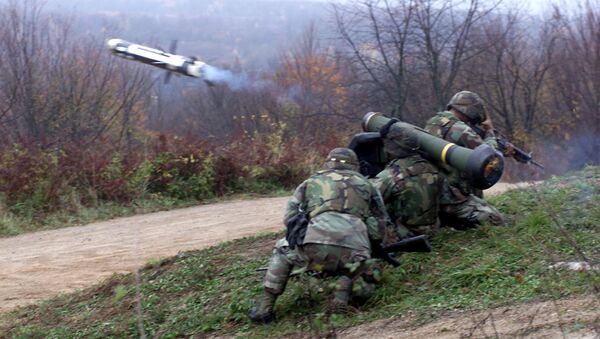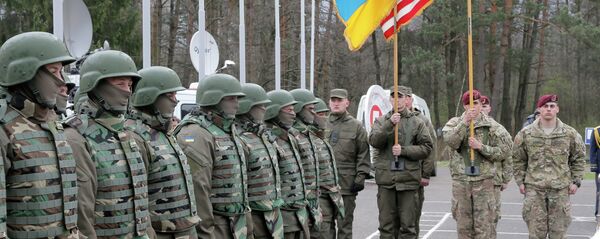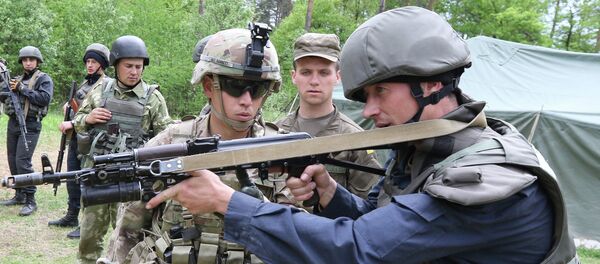Brian Becker and Walter Smolarek of Radio Sputnik's Loud & Clear spoke to Mark Sleboda, a Russia-based international relations and security analyst and frequent critic of US and NATO policy, about the deal.
"First of all, no weapon system is entirely defensive or offensive in nature," Sleboda began. "The US routinely complains about the sophistication of Russian air defense systems, there they remember that they are joint military use, that there's really no distinction between the two of them. But suddenly, when they're supplying arms to Ukraine again, they rediscover the idea of a purely defensive weapon."
"This is one of the most advanced anti-tank weapons in the US arsenal: it is much more it advanced than the [BGM-71] TOW anti-tank weapons that the US was supplying to sectarian militants in Syria allied with al-Qaeda and it also ended up in [Daesh's] hands. These anti-tank weapons haven't actually been field tested against the most modern Russian tanks, but that's not actually what's on the battlefield, the frozen conflict zone. The militias in east Ukraine, in Donbass, are armed with the exact type of older Soviet model tanks that the Ukrainian military is armed with, and the javelin would indeed make short work of them.
"There's other weapons [that are part of the deal]: the Barrett M107A1 sniper rifle, a super advanced, unveiled scriber rifle that can penetrate up to 1.8 inches of steel at a range of 2,000 meters (6560 feet). There is no way in any stretch or form that can be considered a defensive weapon."
With the arrival of these new weapons in Ukraine, Sleboda feared that the tense stand-off in east Ukraine will reignite. "This has the potential to be a serious escalation in the conflict. Congressional officials were reporting that they would expect an increased supply of lethal weapons for Ukraine. Even on its face, it is a serious political provocation, and it marks a departure and perhaps a giving up on the Minsk II Accords by the United States. Those are something that the regime officials in Kiev have long since announced that they have no intention of ever fulfilling."
Sleboda described the terms of the Minsk II Accords, signed by the France, Germany, Ukraine, and Russia, as such: "the main point of the Minsk agreement involves passing legislation that would federalize Ukraine, would announce an amnesty and an exchange of prisoners, would officiate local authorities in the Donbass region to stand for election under their own parties, would end the quite illegal economic sanctions blockade that Kiev has enforced on its own people in east Ukraine, and so on."
"After all local elections are held under terms agreeable to both sides, then the Ukrainian regime in Kiev will be allowed full control of the border between east Ukraine and Russia. But that is the last step. Kiev officials all up and down the spectrum ranks of authority have said they have no intention of fulfilling these political measures, and that the first step now, according to them, despite what they agreed to in Minsk, must be securing the border so that they can isolate and presumably just go about militarily conquering the rest of the country."
Becker asked the Moscow-based Sleboda how the increased US military pressure in Ukraine was going over in the Kremlin, where the issue has a higher profile than it does in the US, as it directly concerns Russia's borders. "There is no single issue outside of Russia more important, not only, you know, to Russia in terms of history and ethnicity and culture, but also as a red line national security issue," Sleboda replied.
"The US and European countries have long supplied lethal weapons to the regime in Kiev, that is nothing new, but previously these have largely been old Soviet Warsaw Pact-era weapons that the Ukrainian military already knows how to use. But in this political escalation, US troops will have to train Ukrainian regime forces to use and to maintain these weapons. We could potentially see more US and NATO troops close to the conflict, and perhaps even on the front lines itself."
"This of course gets extremely dangerous. What happens when the militias in east Ukraine kill American trainers that are training regime forces, or leading them in combat? This is a very potentially politically explosive situation, and Russia has made it clear that they are going to respond."





